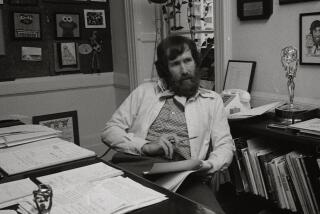Perfectionist Monsters Can Spoil Lives, Analyst Says
- Share via
As a clinical psychologist for the past 14 years, Steven J. Hendlin has seen countless self-help books come on the market--popular books which, in his opinion, were overly simplified and promised far more than they could possibly deliver.
The Laguna Beach psychologist, who is in private practice in Irvine, had book-writing ambitions of his own. But, he felt, most publishers seemed to be interested only in self-help books that were poorly written and treated readers like 12-year-olds.
As a result of what he now labels a “perfectionist tendency,” Hendlin, who has written several dozen articles for professional journals, simply chose not to write a book at all.
“My own perfectionist tendency made me want to have a book that would be a quality, high-level self-help book, and I was concerned with having it lumped in with the other books,” he said. “So it was easy for me to put it off and continue to write professional articles.”
But, as Hendlin writes in his chapter on “the Plague of Perfectionism” in his recently published book, “The Discriminating Mind,” that is “just one more example of how the Perfectionist Monster can rise out of the murk and mire to bite us on the ass . . . nothing very different from what we go through all the time in postponing tackling a project because we don’t want to try if it can’t be perfect.”
Better, he thought, “to keep the book in the realm of Mental Perfection than bring it out into the cold, cruel, rejection-ridden world of publishers, editors and the greater public.”
It wasn’t until he allowed it “to be OK to write ‘just another popular psychology book’ that didn’t have to be perfect that I could go ahead and begin the project. I also needed to be willing to face the possible rejection of publishers who might not think my writing worthy of publication.”
The point, according to Hendlin, “is to use your discriminating mind to know when ‘good enough is good enough’ even if it isn’t perfect.
“Let go of whatever inflated ego feelings go with the need to perform perfectly and allow for your feelings of self-worth to stay in place even if you don’t measure up to someone else who may do the same activity better than you.”
Published in England in October and now available in this country, “The Discriminating Mind: A Guide to Deepening Insight and Clarifying Outlook” (Unwin Hyman; $14.95), is aimed at professional mental health professionals and the lay public “who are interested in knowing themselves and the workings of their minds at deeper levels.”
Hendlin, 41, who has been studying Eastern philosophies and different forms of meditative practices for 20 years, has combined ideas from Western psychology and psychotherapy with Eastern spiritual concepts which, he says, can help us understand ourselves better.
The book, which includes case histories from Hendlin’s practice and offers practical exercises to guide readers to a greater familiarity with their thought processes, examines anger, fear, greed, envy and resentment.
And what exactly is a “discriminating mind”?
According to Hendlin, it is a mind that “combines high-level, rational discrimination with intuition and emotional balance.”
The idea, he said, is that a discriminating mind is something we all develop as we grow into adulthood--yet “it is something we never develop to the highest degree.”
“I suggest one reason is we have so many conflicting ‘inner voices’ that it’s very hard to get past this inner chatter to hear clearly what our individual voices are speaking for.
“One of the themes of the book is we’re always having to deal with this chattering mind and we don’t really learn the skills of how to separate those voices--to be able to hear what our needs are so, instead of being in conflict, the different voices are working harmoniously for the whole self.”
One powerful method for hearing those voices, Hendlin said, is a meditation that helps more clearly distinguish the individual voices and the subtle emotions that are associated with them.
“One thing I’d hope people get out of the book is to re-evaluate the importance of their own inner psychological world--to realize that there is an amazing universe within and to begin to have respect for the methods with which one can work on oneself to learn about that inner world,” he said.
“Another main theme is how easy it is for us to delude ourselves as to our true motivations for doing things. We underestimate the power of our unconscious mind in our daily world. It is crucial for us to understand how much of our behavior is unconsciously motivated.”
Hendlin maintains that “much of our attention is aimed at the fascinating glitz and glitter of the outer world and we’ve become lopsided and disrespectful of really knowing our own minds and the power of the world within. We tend to not make that inner world as fascinating as the outer world. We don’t take the time to explore.”
As Hendlin says, “We never had to take a class in knowing our own minds. Even if you take a psychology class, there is no rigorous examination of how this mind works. That’s one of the questions I try to help people answer.”
“The Discriminating Mind” is currently available at Brentano’s in South Coast Plaza in Costa Mesa, Fahrenheit 451 Book Store in Laguna Beach, the Book Center in Irvine and at various “New Age” bookstores throughout Southern California.
More to Read
Sign up for our Book Club newsletter
Get the latest news, events and more from the Los Angeles Times Book Club, and help us get L.A. reading and talking.
You may occasionally receive promotional content from the Los Angeles Times.










